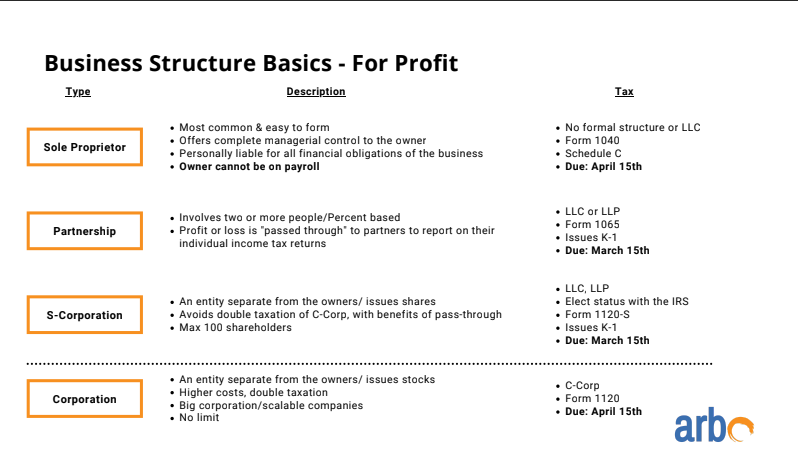When selecting the correct business entity for your startup, it is essential to recall the accounting factors along with organizational and operational elements. Let's dive into the essentials of startup commercial enterprise entities - S Corporation, C Corporation, Limited Liability Company (LLC), and Sole Proprietorship - and find out how they impact your monetary adventure.

Sole Proprietorship - Simplicity with Full Responsibility: As a sole proprietor, you'll have the handiest structure in your startup. You'll experience complete control and flexibility without formalities or legal requirements. However, maintain in thoughts that you and your enterprise are considered one entity in the eyes of the law. This way, you'll be responsible for any debts or criminal responsibilities that could also affect your personal assets. The owner cannot be on the payroll for this type of entity.
Limited Liability Company (LLC) - Flexibility and Protection: An LLC combines the blessings of both partnerships and agencies. It gives flexibility in control and taxation while presenting restricted liability safety. With an LLC, your private assets are separate from the commercial enterprise, shielding you from personal liability. Additionally, LLCs offer tax flexibility, allowing you to select among pass-through taxation or electing to be taxed as a corporation.
Additionally, LLCs offer tax flexibility, allowing you to be taxed as:
- Sole Proprietorship: Where you can include the business income/expenses on Schedule C of your 1040 return
- Partnership: If you have multiple members in your LLC, you'll be automatically elected to be taxed as a partnership where you'll file form 1065, and the tax impact will pass through your personal taxes
- S Corporation: See below for details. The founder can be on the payroll and offers additional benefits/flexibility.
- C-Corporation: See below for detail. The founder can be on the payroll and offers additional benefits/flexibility.
S Corporation - Tax Advantages and Shareholder Restrictions: An S Corporation offers specific tax benefits. To qualify for the S Corporation election, you must meet certain criteria, including having no greater than 100 shareholders and the most effective one class of stock. Compliance with ongoing formalities, conducting regular shareholder meetings and keeping accurate economic information, is vital.
C Corporation - Growth and Complexities: C Corporations are designed for scalability and attracting investors. They offer the potential to reduce difficulty when scaling, as they have no boundaries at the number or form of shareholders even when you go IPO. However, C Corporations are subject to double taxation, where the organization pays taxes on its earnings, and shareholders pay taxes on dividends distributed. This structure requires meticulous report-keeping, compliance with various policies, and annual filing responsibilities. Consider the specific desires of your enterprise, together with its size, funding requirements, boom aspirations, legal responsibility safety, tax implications, and, last but not least, the founders, too, can be on a payroll.
With our tech-enabled accounting solutions, we will simplify your day-to-day bookkeeping and financial management for startups. Our advanced software streamlines financial & tax strategy, enabling you to focus on growing your startup. We will be your partners in ensuring you have accurate financial information to run your business and comply with tax policies. Don't let the waves of financial complexities get in the way of your growth. Let Arbo's tech-enabled accounting services be your manual in making the right choices, maximizing tax benefits, and optimizing your financial position. Schedule a consultation with us and see the difference between tech-enabled accounting for startup financials!